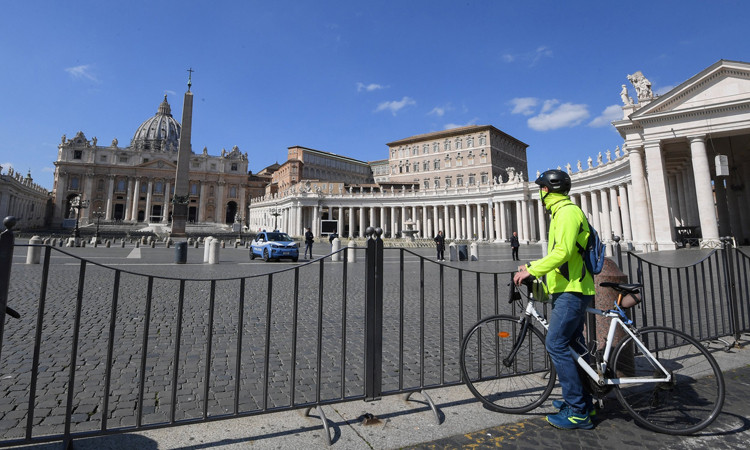Europe 'builds the barn door after the horse is gone'
Faced with the threat of a pandemic that does not distinguish between countries, European countries with the dream of borderless living are erecting "walls" everywhere.
Emptiness and desolation are looming over glamorous Europe, with grand squares and stadiums empty. Luxury museums, restaurants and bars are closed. Anxiety, fear and division are growing in communities.
After watching Covid-19 rage in China with indifference, Europe seems to be panicking about the situation in Italy. Many countries suddenly imposed travel restrictions, such as Spain.nationwide lockdown, Czech Republic asks people to limit going out, or Germany controls the border with neighboring countries. This situation makes the idea of a united and borderless Europe become distant.
 |
| People stand in St. Peter's Square, Vatican on March 15 while Italy is under nationwide lockdown. Photo:Reuters |
“The paradox of a cross-border virus is that solutions require separation, not only between countries, but also within them,” said Nathalie Tocci, an adviser to the European Union (EU). With Italynationwide lockdownWith many countries controlling entry, more than 100 million Europeans are affected by a series of travel restrictions.
"The problem now is not only between borders but also between individuals," said Ivan Krastev, an expert at the Center for Liberal Strategies in Sofia, Bulgaria. "Everyone around them is a potential carrier. They may not know they are a danger to others. The only person who does not pose a threat is the person who stays at home."
The lives of Europeans, who prided themselves on the strength of their technology, institutions and democracy, were turned upside down. Kisses and hugs meant to comfort or encourage became potentially dangerous. People had to be wary of their neighbors and even their own families.
However, Tocci noted that lockdowns would not work without coordination between countries. In addition, erecting "walls" in reality no longer makes much difference, because the "invisible enemy" has crept inside, commentator Steven Erlanger ofNY Timescomment
The World Health Organization (WHO) on March 13 declared Europe the epicenter of the Covid-19 pandemic and warned that the peak of the epidemic could not be predicted. On March 15, the three European countries most severely affected by Covid-19, Italy, Spain and France, all recorded a record number of deaths from nCoV in a single day, bringing the total number of deaths in these countries to more than 1,800, nearly 300 and nearly 130, respectively.
The situation in the UK is also increasingly worrying, as the number of infections has reached nearly 1,400 with more than 30 deaths. According to confidential documents from Public Health England,Guardianrevealed that 80% of the country's population could be infected with nCoV in the next 12 months. "Up to 15% of the population, equivalent to 7.9 million people, will have to be hospitalized for treatment," the document said.
"The overwhelming emotion right now is fear. The Covid-19 crisis has compounded the insecurity and fear, and increased the confusion about a world that is changing so quickly. You can get infected just by putting your hand on a doorknob. That is the height of fear," said French political scientist Dominique Moisi.
He believes that in the face of an "invisible enemy", social mobilization is difficult but necessary. "Paris lost 150 lives in one night in 2015 due to terrorism. It was brutal, but it was visible. Meanwhile, the final death toll from nCoV will be much higher and it is invisible," Moisi said.
European governments that have struggled to calm the public in the face of terrorism now face a different challenge: how to scare the public into acting in the common good.
In 2003, the French-American philosopher George Steiner, who died last month at the age of 90, wrote a famous essay called “The Idea of Europe.” He argued that European cultural identity included cafes where people met and socialized, plus a love of walking in crowded squares and side streets.
Krastev points out that during the pandemic, cafes were closed, while squares and streets were almost deserted. Therefore, both of these cultural features were destroyed, leading to a feeling of isolation and loneliness among people.
But the gloom in Europe has occasionally been broken by unexpected acts of humanity and solidarity, Tocci said. Italians have sung together from isolated balconies and expressed their appreciation for the hard-working medical staff.

